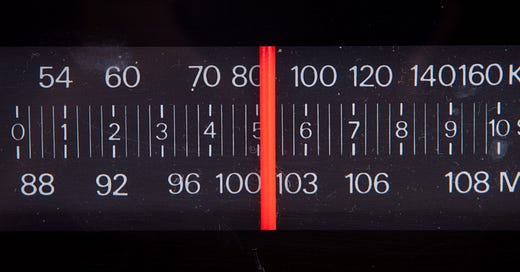In college my friends sometimes called and said, “You woke me up!” They’d sound good excited. Not angry. And it wasn’t me, just my voice on the radio, and not even my live voice but a story I’d recorded the day before. We called them “cart stories” because they were taped on 30- or 60-second cartridges that a radio station could pop into regular newscasts throughout the day.
The secret joy of writing news stories is they got trashed right away. You’re always pressed to do your best work, fast, and it’s always erased soon after. It makes writing seem less… precious. And it’s fun. I spent months as an intern at a community college affiliate of National Public Radio, and it was fun to sit in the tiny newsroom with other reporters and rip stories off the wire service printer and make phone calls, and to write.1
After hours, we could reserve the booth and record our own feature stories2, and it was these my friends would hear the next day. My voice crooning, “You’re listening to the mellow sounds of KLLC Jazz & News.” What no one heard was our whispering. As part of our training, we had to read our copy aloud to make sure it would read smoothly on air. The on-air announcer never had time to pre-read stories before the newscast so those stories had to be written in clear, simple language he wouldn’t stumble through. If he stumbled, it was the writer’s fault.
To keep our jobs – or unpaid internships – we had to quietly read our work as we wrote. This created a hushed murmur like people praying, all the time, in the news room. Ten years later Tom Spanbauer hit us with the same rule: People had to read their fiction aloud in the Dangerous Writing workshop. Tom had acted in the Bowery Theater Company while he’d studied under Gordon Lish at Columbia. And Lish had also made students read aloud. So for Tom stories were a chance to practice both acting and writing.
After all, the goal was to get published. And publishing meant a book tour. And a tour meant reading aloud so you might as well learn to do it well. By reading aloud you’ll learn where to use dentil sounds like Ds and Ts. That’s why so many of my best stories end on popping sounds and negations such as “don’t” or “not” or “stop.” Another trick is to end one word with the letter that starts the next, “silver ribbons” or “Lisa’s silver,” because it forces you to speak more carefully and enunciate each word.
Better than that, reading aloud taught us where our work failed. Little in writing is as painful as finding yourself midway through a story that’s flabby or flat.3 You’re boring even yourself. And no put-on excitement in your voice can save the stretches of story where you’ve lingered too long. Your description of a sunset waxes on and on. Or, you’re stuck running endless circles inside a character’s head.
If you do nothing else, read your work aloud to yourself. If you want to save yourself possible humiliation, read your work aloud before you read it to any friends or workshop. If you have no workshop, read it out loud alone.
If you’re going to bore or confuse anyone, let that person be you. Mark the places where you stumble. Then fix them.
This is Chuck Palahniuk wishing you a good night from the campus of Lane Community College in Eugene, Oregon. This concludes our broadcasting day.
Spend a little to get a lot more. Real writers itemize and take every expense off their taxes. Get in the habit, or someday you’ll get screwed by taxes when you sell something big.
Our Associated Press printer had a light that would flash when a big story was about to come through. As a warning for someone to stand by and grab the paper and rush it into the broadcast booth. On Halloween night in 1984 a bell began to ring. We looked everywhere and at last found the sound coming from that printer. To our amazement it had a special bell designed to ring only when top-top stories were arriving. No one at the station had ever heard that bell. Indira Gandhi had just been assassinated.
This recording could only be done during station off-hours. Midnight to 5:00am. At those times my insomnia seems like a precious gift.
Keep in mind that good reading depends on your pauses as well as your words. Big-time radio announcers like Paul Harvey and Dr. Laura Schlessinger would break a sentence in the strangest places and hold a silence to build tension. This halting staccato kept people listening close. And it teaches the writer to add breaks of silence or bland attribution to pace a story better. The reader needs some rest on occasion. Inserting attribution such as “he said” is as good as holding a quick pause. Remember Harvey’s signature, “And now… the rest of the story!”








I'm assuming Hemingway never read his stories to himself. My god he goes on and on.
Yes! As a spoken word performer and former college speech teamer—- this is how I was able to find my voice and edit.
Best part about bar poetry nights— you learn to deal with bar crowd sounds— people laughing in personal conversations and not at your material— that helped to form my armor when on stage. The lights also were a lifesaver because I couldn’t see anyone’s faces. I knew shoes well, though.